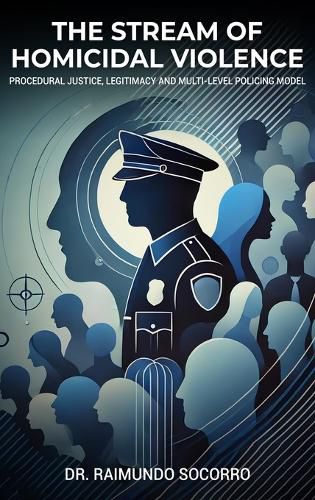Readings Newsletter
Become a Readings Member to make your shopping experience even easier.
Sign in or sign up for free!
You’re not far away from qualifying for FREE standard shipping within Australia
You’ve qualified for FREE standard shipping within Australia
The cart is loading…






This title is printed to order. This book may have been self-published. If so, we cannot guarantee the quality of the content. In the main most books will have gone through the editing process however some may not. We therefore suggest that you be aware of this before ordering this book. If in doubt check either the author or publisher’s details as we are unable to accept any returns unless they are faulty. Please contact us if you have any questions.
With over 28 years of experience as a police executive, Dr. Raimundo Socorro has become a transformative leader in redefining modern policing. Early in his career, he was driven by a "crime control" mission, determined to arrest and convict offenders at all costs. However, over time, he discovered a more humane, effective approach-one rooted in Procedural Justice.
While earning his Ph.D. in Leadership, Dr. Socorro deepened his understanding of this method, which emphasizes fairness, transparency, and community engagement. As Dean of the School of Justice at Miami Dade College, he has spearheaded efforts to recalibrate police training, integrating Procedural Justice principles into the academy's curriculum to address the shortcomings of traditional reactive and paramilitary policing models.
Dr. Socorro challenges the outdated "crime control" approach, particularly its reliance on excessive force and its disproportionate impact on minority communities. He introduces a new vision: policing that integrates into the "stream" of community life rather than standing on the sidelines. By understanding the structural and cultural forces that contribute to violence, law enforcement can become active participants in community conflict resolution.
Central to this vision are strategies like focused deterrence and the use of violence interrupters-locally trusted individuals who mediate conflicts at the grassroots level. These efforts create respectful dialogue between law enforcement and communities, breaking down barriers and fostering collaboration.
Procedural Justice prioritizes legitimacy through public trust, emphasizing the importance of fair treatment, impartiality, and transparency. Its core principles-giving the public and offenders a voice, ensuring fairness, demonstrating neutrality, and maintaining transparency-offer a pathway to rebuilding relationships between police and the communities they serve.
$9.00 standard shipping within Australia
FREE standard shipping within Australia for orders over $100.00
Express & International shipping calculated at checkout
This title is printed to order. This book may have been self-published. If so, we cannot guarantee the quality of the content. In the main most books will have gone through the editing process however some may not. We therefore suggest that you be aware of this before ordering this book. If in doubt check either the author or publisher’s details as we are unable to accept any returns unless they are faulty. Please contact us if you have any questions.
With over 28 years of experience as a police executive, Dr. Raimundo Socorro has become a transformative leader in redefining modern policing. Early in his career, he was driven by a "crime control" mission, determined to arrest and convict offenders at all costs. However, over time, he discovered a more humane, effective approach-one rooted in Procedural Justice.
While earning his Ph.D. in Leadership, Dr. Socorro deepened his understanding of this method, which emphasizes fairness, transparency, and community engagement. As Dean of the School of Justice at Miami Dade College, he has spearheaded efforts to recalibrate police training, integrating Procedural Justice principles into the academy's curriculum to address the shortcomings of traditional reactive and paramilitary policing models.
Dr. Socorro challenges the outdated "crime control" approach, particularly its reliance on excessive force and its disproportionate impact on minority communities. He introduces a new vision: policing that integrates into the "stream" of community life rather than standing on the sidelines. By understanding the structural and cultural forces that contribute to violence, law enforcement can become active participants in community conflict resolution.
Central to this vision are strategies like focused deterrence and the use of violence interrupters-locally trusted individuals who mediate conflicts at the grassroots level. These efforts create respectful dialogue between law enforcement and communities, breaking down barriers and fostering collaboration.
Procedural Justice prioritizes legitimacy through public trust, emphasizing the importance of fair treatment, impartiality, and transparency. Its core principles-giving the public and offenders a voice, ensuring fairness, demonstrating neutrality, and maintaining transparency-offer a pathway to rebuilding relationships between police and the communities they serve.